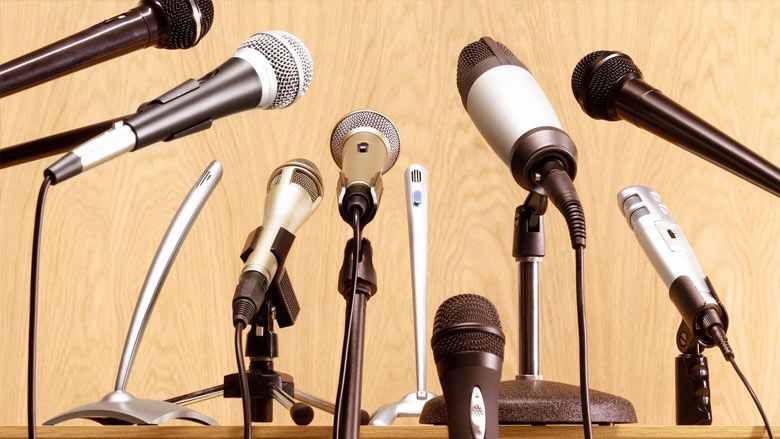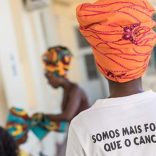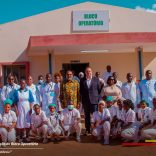Mozambique records around 25,000 cases of cancer per year
CPLP: Media freedom worse in Guinea-Bissau, Mozambique, better in Angola, Timor

Image: DW
Media freedom has deteriorated in three out the nine countries that have Portuguese as an official language, with Guinea-Bissau suffering the biggest fall and East Timor recording the sharpest rise, according to the annual index of Reporters Without Borders, an international non-governmental organisation that works for freedom of information.
According to the index, which was released on Tuesday and which ranks media freedom around the world, assessing 180 countries, among members of the Community of Portuguese-Language Countries (CPLP) Guinea-Bissau, Brazil and Mozambique slipped down the rankings from the previous review, while Portugal, East Timor and Angola improved. Cabo Verde and Equatorial Guinea maintained their positions from the previous index.
Guinea-Bissau this year ranks 94th in the world in terms of media freedom, down five places. In this year’s report, the NGO describes “the political impasse” in the country in recent months as been “an obstacle to press freedom”. It cites the occupation of the headquarters of the public radio and television broadcaster by military personnel close to the self-proclaimed president of the country, Umaro Sissoco Embaló, in early 2020, in the context of the political crisis that arose after December’s second round of presidential elections.
In the view of Reporters Without Borders, Guinea-Bissau’s media and journalists remain “extremely vulnerable” to political and economic pressures, free access to information is not guaranteed, and self-censorship prevails in addressing government failures, organised crime and the military’s influence on society.
The index also shows Brazil slipping two places to 107th, while Mozambique drops one 104th.
The report says that Brazil remains a “particularly violent” country for the media.
“President Bolsonaro, his close associates and several members of the government regularly insult and humiliate some of the country’s most important journalists and media, promoting a climate of hatred and contempt for journalism,” it states.
In Mozambique, the report denounces “strong pressure” and “frequent aggressions” against independent journalists. It says that it is “almost impossible” for journalists to work in the north, where armed groups have been attacking villages and looting and killing civilians; it notes that two journalists who tried to do so were detained for four months in 2019.
The NGO also points to the increasing difficulties that foreign journalists face in obtaining accreditation to work in Mozambique.
At the other end of the spectrum, East Timor has risen six places in the index, to 78th, with the report stating that “relatively free” coverage of episodes of government instability last year and this “made it possible to highlight the role of media pluralism in the exercise of Timorese democracy.” Nevertheless, it notes that journalists face “lawsuits as a form of intimidation, police violence and public defamation” on the part of the authorities.
Angola, meanwhile, climbed three places in the ranking to 106th. The report highlights “encouraging signs” such as the acquittal of investigative journalists in 2018, but note that “the four television channels, radios and around twenty print media headlines remain largely under the control or influence of the government and the ruling party.
“Censorship and self-censorship remain very present,” it says, adding that the “exorbitant costs of radio and television licenses are a brake on the pluralism” of the Angolan media.
Portugal has also improved its ranking, rising two places to 10th out of 180 countries.
Cabo Verde (at 25th) is the second-highest-ranked Portuguese-speaking country in the index, while Equatorial Guinea (at 165th) is the worst. Both maintain their respective rankings.
With regard to Cabo Verde, the report highlights a decrease in political control over the state-owned media, pointing to the government’s decision to relinquish the appointment of directors at the public television broadcaster, who are now to be chosen by an independent council.
On Equatorial Guinea, the NGO denounces the government’s “total control of the media” and “general censorship”, highlighting the detention of two journalists for having conducted an interview. The journalists, who worked for a private television station owned by the country’s vice-president, ‘Teodorin’ Obiang, who is a son of the president, have since been released but have not returned to work.
Of other Portuguese-language countries, the report does not mention Sao Tome and Principe.
Published since 2002, the annual index of Reporters Without Borders provides an overview of freedom of information in 180 countries and territories. It assesses the performance of countries in terms of media pluralism and independence, self-censorship, legal framework, transparency and quality of infrastructures supporting the production of information.












Leave a Reply
Be the First to Comment!
You must be logged in to post a comment.
You must be logged in to post a comment.